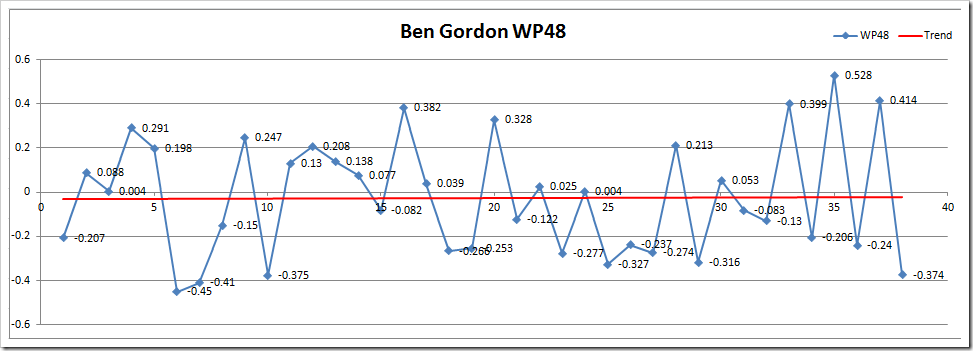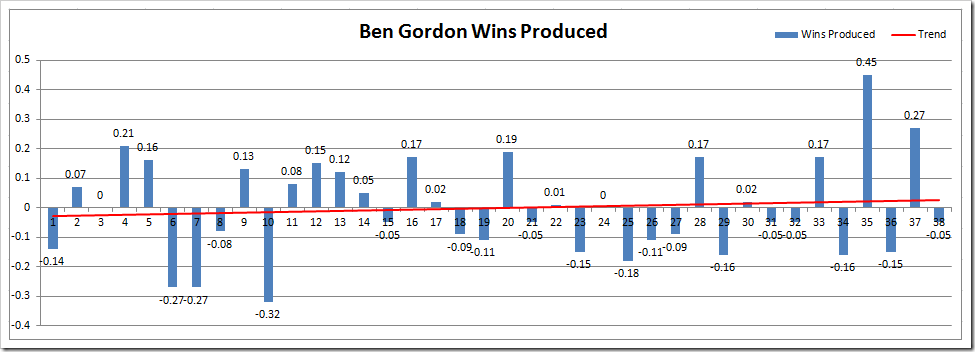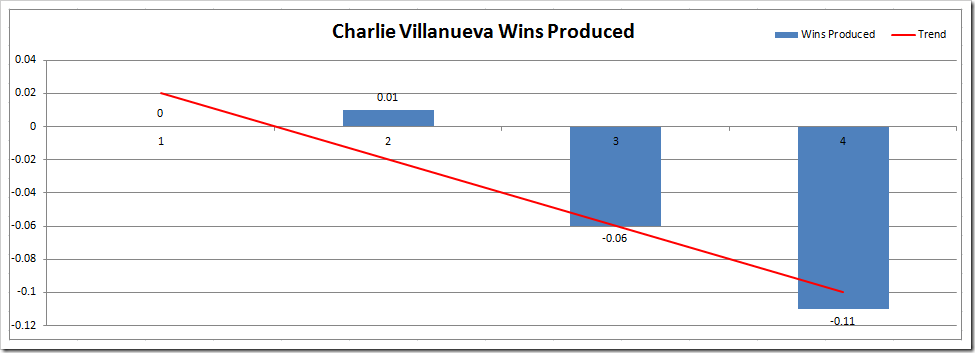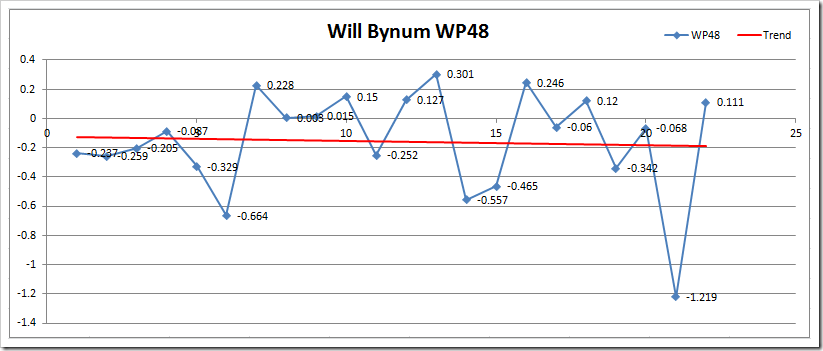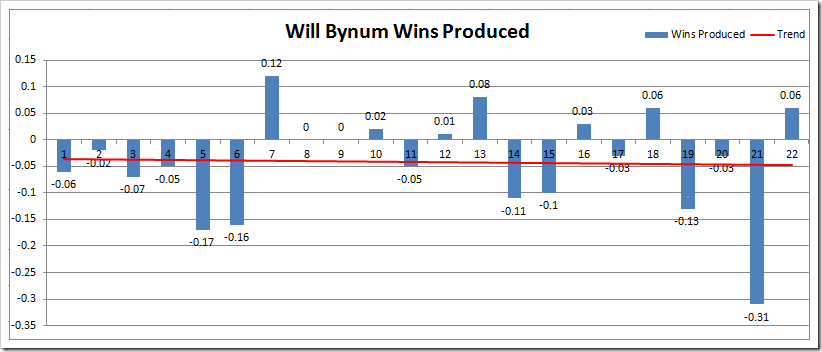Preface:
Hello! How’s it going? Better than the Pistons’ season so far, I hope.
This blog has been about as efficient as a Josh Smith three point attempt over the past year (I’m full of them today). There are two main reasons for this. First, Wins Produced numbers are easily accessible via Box Score Geeks, and one of my primary reasons for starting this blog was to get WP numbers out there for interested Pistons fans. There’s less need for that now that Wins Produced has been automated and new data is available daily. Second, I’m doing a lot of game-by-game stuff over at Detroit Bad Boys, which usually includes a good bit of Wages of Wins inspired statistical analysis if not wins produced numbers directly.
That said, my plan is to write a handful of posts here each season that are specifically related to Wins Produced and its derivative metrics, in addition to to writing for DBB on a weekly basis. My goal is to identify trends and to speculate on some of the how? and why? questions that Wins Produced doesn’t claim to or try to answer.
End Preface.
After 26 games, the Pistons are not where they thought they’d be, not where the numbers suggested they might be, and certainly not where fans hoped they’d be. In spite of this, given how terrible the Eastern Conference has been thus far (only Indiana and Miami have winning records), the Pistons find themselves tied for fourth place with the Boston Celtics in the Playoff hunt, meaning that yes, if the Playoffs started today, Boston and Detroit would battle it out in the first round of the Playoffs.
However, that’s little solace for fans who enjoy good basketball, and a losing record hasn’t been enough to dramatically improve attendance, and thus substantially increase revenue for new owner Tom Gores. Presumably, no one is all that happy so far.
So, what gives? First of all, the numbers (as always, provided by Box Score Geeks):
| Player | Position | Minutes | Wins Produced per 48 | Wins Produced |
| Andre Drummond | C | 855 | 0.329 | 5.85 |
| Greg Monroe | C | 884 | 0.101 | 1.87 |
| Kyle Singler | SF | 582 | 0.131 | 1.59 |
| Brandon Jennings | PG | 890 | 0.060 | 1.11 |
| Josh Smith | SF | 935 | 0.039 | 0.76 |
| Rodney Stuckey | SG | 637 | 0.049 | 0.65 |
| Josh Harrellson | FC | 156 | 0.148 | 0.48 |
| Kentavious Caldwell-Pope | SG | 568 | 0.025 | 0.29 |
| Tony Mitchell | F | 34 | 0.409 | 0.29 |
| Charlie Villanueva | PF | 61 | 0.134 | 0.17 |
| Chauncey Billups | G | 203 | 0.038 | 0.16 |
| Jonas Jerebko | PF | 149 | 0.012 | 0.04 |
| Will Bynum | PG | 199 | -0.011 | -0.04 |
| Peyton Siva | PG | 76 | -0.232 | -0.37 |
| Luigi Datome | GF | 86 | -0.264 | -0.47 |
The Good:
Andre Drummond is incredible. If you have thirty free minutes, go search YouTube for Andre Drummond highlights, and prepare to be amazed. Not a game goes by without opportunity to to be amazed. Fortunately, his highlights aren’t just empty hype. Andre Drummond is fourth in the NBA in total Wins Produced, trailing Chris Paul, LeBron James, and Kevin Durant.
As to the why of those numbers, it’s relatively simple: Andre takes and makes a lot of very high percentage shots – which include a developing back to the basket hook shot, as well as more alley oops than I can count – and is a black hole when it comes to rebounds. He’s also one of the best big men I’ve ever seen in terms of playing the passing lane and forcing turnovers. Andre Drummond converts nearly 62% of his shots, snags almost 28% of all available defensive rebounds when on the floor, and just over 16% of all available offensive rebounds.
As to the how, it’s also relatively simple: Andre Drummond is one of the most athletically gifted human beings on the planet. His game is raw and unpolished. He’s shooting under 40% from the free throw line. He frequently misses rotations on defense. But none of that matters, because his natural talents and instincts more than make up for all of that. Simply, he’s an incredible talent.
The next most productive Piston is surprisingly Kyle Singler. Arguably, Kyle should be starting over Josh Smith at small forward. Kyle’s productivity is being driven by an incredible true shooting percentage; at just over 60%, Kyle actually leads the Pistons, which is all the more remarkable given Dre’s 62% shooting from the field. Other than making his shots, Kyle isn’t doing anything remarkably well, but that shooting is enough for the moment.
Greg Monroe’s numbers in the table above may seems surprisingly low, and frankly, I’m a little surprised by them. Note, however, that Box Score Geeks classifies him as a Center, but in reality, he’s playing much more Power Forward, where his numbers compare more favorably (and more accurately): .141 WP48, 2.5 Wins Produced.
Last season, Greg Monroe struggled early in the year adjusting to his new role as the Pistons’ go-to scorer. This year, his role has changed again. Most nights, he’s the fourth option, behind Brandon Jennings, Josh Smith, and Rodney Stuckey. It’s hard to believe, but Greg Monroe is averaging fewer shots per game than any other season as a pro, except his rookie year.
For reasons I cannot understand or explain, the Pistons seem committed to making Greg Monroe a complementary player volume scorers who are significantly less effective than he is. Joe Dumars at his finest.
Josh Harrellson is also playing well in limited minutes, but his role is increasing as the season progresses.
Charlie Villanueva has only played 61 minutes, and that is fantastic.
The Bad:
Kentavious Caldwell-Pope is not putting up good numbers, and it has everything to do with shooting and shot selection. It’s clear that he hasn’t yet developed NBA range or consistency, and it’s clear that he hasn’t figured out what’s a good shot and a bad shot commensurate to his role. He’s improving as the season progresses, and there’s a lot of reasons to be excited about his long-term future – including his fantastic on-the-ball defense – but he’s not there yet.
Rodney Stuckey is getting a lot of praise in his role off the bench. Early, it was warranted. However, as has always been the case with Stuckey, his production is quickly regressing to the mean. Stuckey has been consistently inconsistent throughout his career, and that hasn’t changed this season.
Brandon Jennings is torture to watch if you enjoy teamwork, good shot selection, and ball handling. He’s a definite upgrade over Brandon Knight, but an apt comparison is that he’s simply an improved version of Brandon Knight. He calls his own number far too often, he dribbles out the shot clock and forces his offense into bad shots as a result, and is one of the worst on-the-ball defenders I’ve seen at PG. Jose Calderon, we hardly knew you.
The Ugly:
Josh Smith has been an offensive disaster for the Pistons. It only takes watching on broadcast on Fox Sports Detroit to see how hard the franchise is trying to sell its fanbase on Josh Smith. Commercial after highlight reel after interview dominates the airwaves during game breaks. He is the highest paid player in franchise history, so it makes sense in that regard.
In terms of production, however, Josh Smith is almost exactly the same player for the Pistons as he was in Atlanta last season. If you have a weak stomach and an appreciation for basketball, I would not encourage you to click through to his shot chart. It is a disgrace to basketball.
The table above presents Josh Smith as a Small Forwards, which he is, some of the time. Compared to other Small Forwards, he’s below average. Compared to Power Forwards, however, where Smith does spend a large chunk of his playing time, he’s producing negative wins.
Yes, the richest Piston on franchise history is actively taking wins off the board.
When it comes to things not related to shooting and scoring, Josh Smith is pretty good. He’s a good rebounder. He’s a good passer. He blocks shots and gets steals. He’s not great at any of those things, but he’s good at all of them, and in that sense, he’s a very well rounded player.
Unfortunately, all of that is rendered irrelevant by Josh Smith’s terrible shot selection, atrocious shooting, and propensity to shoot the ball constantly in spite of being terrible at it.
Here, the analysis doesn’t need to go deeper. Josh Smith is a terrible offensive player who chooses to be terrible at offense as often as the opportunity presents itself.
Jonas Jerebko is mostly out of the rotation thanks to the Josh Smith acquisition. Naturally, Jonas Jerebko has been more productive over the course of his career, so it makes sense the Pistons would bury him on the bench to make room for a toxic player like Josh Smith.
As someone who enjoys good basketball and as a fan of Jonas Jerebko’s style of play, I sincerely feel badly for Jonas. He’s not and never will be a great player, but he’s a useful player in the right role, and ironically, the Pistons could really use a player like him to play the role he’s best at.
Luigi Datome was a great player in Italy. He’s been a terrible NBA player so far. Limited minutes likely have a lot to do with this, but it’s hard to see him getting an increased role given the way Maurice Cheeks has handled the rotation thus far.
Will Bynum continues to be terrible. He’s a bad shooter, turnover prone and ball hoggy. He really has no business in the rotation.
Summing Up:
The Pistons are 12-14, and they’ve earned it. At the franchise level, they have committed significant money and roles to players – Brandon Jennings and Josh Smith – who can’t carry a team to anything better without overhauling their entire approach to the game.
As a fanalyst, this is made all the more infuriating by the fact that these decisions have been made at the expense of players who could make the team better, and at a significantly better price. Players like Jonas Jerebko, Josh Harrellson, and Kyle Singler aren’t glamorous, but they’re all the type of hard-working, blue-collar players that would be expected to thrive in Detroit – a city whose basketball franchise prides itself in its underdog reputation.
From the long-term perspective, this season has the potential to be much more damaging. Greg Monroe is the best offensive player in the Pistons’ employ. During his first two seasons, it was obvious to everyone but the Pistons’ coaching staff that he deserved to be the first option on merit. Last season, he settled into that role nicely in the second half of the season, and particularly well with Andre Drummond and a pass-first facilitator like Jose Calderon.
Unfortunately, the franchise appears to have given up on what appeared to be that sure bet, and has done so to its detriment. Instead of betting big on big-time players like Andre Drummond and Greg Monroe, Joe Dumars opted for more of the same in Josh Smith and Brandon Jennings – who fit the mold of Allen Iverson, Ben Gordon, and Charlie Villanueva all to snugly.
At 12 wins and 14 losses, the Pistons are better than last season, yes, but they are worse than they could be and are in danger of betting the franchise’s future – which is tied directly to Greg Monroe’s willingness to remain a Piston in free agency – on today’s mediocrity.
Fortunately, there is still a lot of NBA season left to turn this around, and the fixes aren’t that difficult, at least in theory. Here’s hoping against hope they happen.



